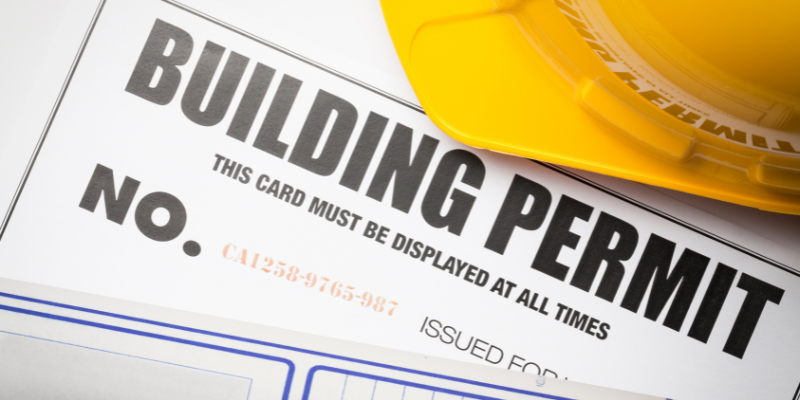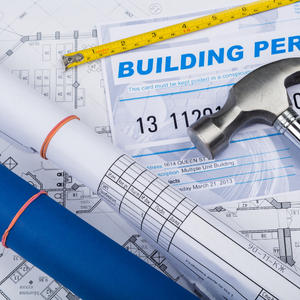
Steps to Identify Unpermitted Work in Your Michigan Property
Identifying unpermitted work is pivotal to executing a seamless transaction when selling a home in Michigan. Start by checking the specific property details in the local building department, as they hold the permits and documents pertinent to any construction done on the house.
Ensure you inspect your home’s features with a particular focus to unpermitted work remodels like decks, garages, attics, and basements. Check for any signs that point towards recent remodels that do not comply with the permit history.
Look for specialists like home inspectors who concentrate on homes for renovations or modifications and have experience with unpermitted changes; they can identify inaccuracies between the actual home and what has been permitted. Also, check previous property listings or appraisals to find estimate differences that can indicate unapproved changes have been made.
These thorough checks can help identify issues such as unpermitted work that could be resolved before putting the house up for sale, and Blue Moon Acquisitions can assist you in navigating those challenges efficiently.
How Local Building Codes Affect Home Sales in Michigan

It is particularly important to comprehend the local building codes when selling a home in Michigan, especially if there is unpermitted work on the property. In Michigan, each municipality promulgates its building codes and regulations which, differ from one municipality to another, can greatly affect the sale of a home.
Sellers must keep in mind that unpermitted work may be constructed contrary to local standards, making the sales transaction more complex. Buyers have become more selective with homes that have unpermitted changes as they could be subject to steep penalties for noncompliance in the future.
In addition, lenders and insurance providers often require strict adherence to local building codes prior to loan or policy approval. This means that sellers may need to address the municipal violations and/or obtain permits retroactively in order to complete the sale.
These local regulations, when properly addressed, can significantly mitigate obstacles during negotiations and inspections. Proactively resolving discrepancies prior to initiating negotiations can substantially reduce friction during the process and may also position you to sell your home for cash in Bloomfield Hills or nearby cities.
The Role of Inspections in Identifying Unpermitted Work Before Selling
In Michigan, the potential for unpermitted work poses unique challenges for homeowners preparing to sell. Inspections are integral to the detection of discrepancies well before listing the property. Licensed professionals are particularly adept at finding concealed renovations and modifications to the home’s structure that would go unnoticed by untrained eyes.
These inspections are crucial in illuminating the scope of unpermitted electrical, plumbing, or even structural alterations provided by unscrupulous contractors who did not get approval from relevant local authorities. Identifying these issues allows sellers to explain them away and rectify the problems either by applying for appropriate permits or correcting the work to meet compliance standards.
General compliance with the law and local regulations builds trust with prospective buyers and prevents numerous difficulties in the closing stages of the sale. Furthermore, full disclosure regarding the results of inspections, including problems found and their resolutions, elevates the seller’s trust and credibility while fostering smooth negotiations for every participant.
Assessing the Risks of Unpermitted Work Before Selling a Home
Assessing risks while ensuring a seamless transaction is important when selling a home in Michigan with unpermitted work. Such alterations may undermine the property’s market value and dissuade prospective buyers owing to underlying legal and safety concerns.
While selling a home, undisclosed work and changes do need to be dealt with in a proper manner. Uninvited changes do need to be dealt with in the right manner. Uninvited changes in work done need to be handled well in order to avoid being sued later. Any work done without permission needs to be addressed legally.
Property lawyers who have been working in and around Michigan have legal obligations that, when fulfilled, come with useful rewards. Understanding complex problems during the negotiation phase is very critical, as it enables the sellers to strategize on negotiating the repair work to be done, seeking the necessary permits, or even coming up with a new selling price while still having the option to sell your home for cash in Canton or nearby cities.
Legal Implications of Selling a House with Unpermitted Work
Understanding the legal aspects when selling a home in Michigan with unpermitted work is vital. Unpermitted work is likely to cause problems during the transaction, as prospective buyers may be discouraged from purchasing a home that is not compliant with local building rules.
Unpermitted alterations or additions are red flags and, therefore, sellers need to disclose these changes to have a chance of mitigating legal claims in the future. Not telling the property owners may subject the seller to post sale lawsuits or claims of damages.
In Michigan, obligated sellers must issue a seller’s disclosure statement that contains information regarding the renovations or additions that were carried out without permits. In addition, unpermitted work can greatly affect a buyer’s processing of loans because lenders, for the most part, do not accept poorly maintained properties that will add value to the company through mortgage lending.
Unpermitted work done should be reconciled through making a retroactive permit application or, if possible, done to mitigate bringing the property to minimum compliance required by Michigan laws so as to avoid future legal confrontations. It is advised that sellers discuss such matters with their real estate professionals first.
Disclosing Unpermitted Work: What Michigan Sellers Need to Know

Avoiding potential legal disputes and ensuring a smooth sale process requires full disclosure when selling a home in Michigan containing unpermitted work. Unpermitted work, in particular, is commonly found in homes that have undergone renovations without obtaining the necessary building permits. Under Michigan law, it is mandatory to provide the buyer with a Seller’s Disclosure Statement, which contains all relevant information regarding unpermitted work.
This disclosure process fosters trust and rapport between the two parties, minimizing chances of bitter disputes post-sale. Sellers should make an effort to collect all relevant information about unpermitted work such as receipts and notes to provide buyers with an overview about the changes that were made in the home.
It is equally useful for sellers to speak to real estate professionals or attorneys acquainted with local policies to appropriately navigate these disclosure requirements. Legal consequences can be incurred by the seller if unpermitted work is found after the sale, which also threatens the validity of the sale.
By resolving these concerns in advance, sellers keep the option open to negotiate for appropriate compliance repair costs or price alterations while staying compliant with repairs and adjustments mandated by Michigan’s real estate statute.
Importance of Full Disclosure Agreements in Real Estate Transactions
In the context of real estate transactions, full disclosure agreements are essential for any changes made to a Michigan home, especially when the alterations are unpermitted. These agreements help sellers document information related to work done on the property, which is critical when selling a house with unpermitted remodeling work.
Sellers can avoid falling into legal battles while safeguarding their reputation by adhering to full disclosure agreements because they pay attention to each detail involved. In Michigan, unpermitted changes made to a property without notice are severe oversights and protecting against them while having peace of mind is crucial in ensuring a legally sound sale.
With full disclosure agreements, sellers paint a comprehensive picture of the house up for purchase, thus avoiding unnecessary haggling. Real estate professionals make it a point to underscore disclosure agreements not just to protect the buyers but to make sure that both sides come out of the transaction satisfied.
Preparing Your Home for Sale: Handling Unpermitted Renovations
Resolving issues with unpermitted work on your Michigan home is vital before trying to sell due to potential legal issues, and scope of work like electrical, plumbing, or structural renovations requires assessment and addressing for Michigan buyers.
A local real estate professional within the bounds of Michigan can be helpful in addressing the matters around the property value and marketability as they have years of experience within the market. You might consider bringing the work up to code by retaining licensed contractors to rectify any work deficiencies or applying for the necessary permits retroactively.
Additionally, builder trust is achieved with prospective buyers through transparency, therefore, unpermitted renovations should be outlined in the sellers disclosure statement. Overall buyer assurance along with problem area identification can be achieved through pre-sale home inspections.
Proactive management of all these aspects not only provides ease of transaction but also better offers for educated buyers with well-informed knowledge within the competitive Michigan real estate market.
Pros and Cons of Obtaining Permits After the Fact Before Selling
In the context of a Michigan home sale, applying for permits after the fact for unpermitted work performed may either strategically benefit or disadvantage the seller. The potential value enhancement of securing permits post modification made to the property’s value serves as its compliance with local building codes and safety standards.
This can enhance buyer confidence, mitigate legal liability, and diminish chances of lawsuits afterwards. Moreover, mitigation of legal red flags due to absence of critical permits increases efficiency during the sale process, thereby accelerating the close date.
Chasing permits can be counterproductive as well. In addition to previous red flags, the seller could be subjected to paying for new red flags such as expensive fees, extra inspections, or mandatory updates to already in-compliance building codes.
Moreover, the seller could be subjected to discovering new compliance issues not previously addressed, which can further drive up allowable expenses and delay sale timelines. For sellers concerned with the market readiness of their Michigan home with unpermitted work done, weighing these benefits and drawbacks is critical.
How to Legally Sell a House with Basement or Attic Conversions
Selling a home in Michigan with unpermitted basement or attic conversions comes with legal and real estate hurdles that must be cleared methodically. It is essential to disclose all unpermitted work to potential buyers.
Trust and legal goodwill achieved by providing full disclosure to buyers will aid in preventing legal issues. A local Michigan realtor would be best to request due to their knowledge of the housing market and pricing strategies that factor in unpermitted work.
Moreover, the seller may consider employing a qualified contractor to evaluate safety and code compliance of the modifications which are already done. They can provide estimates for possible corrective measures for code compliance. If it is practical, retroactively applying for permits from authorities may enhance marketability and value of the property.
These external factors affect inspection assessments of unpermitted areas in buildings, making understanding zoning laws and building codes essential. With these factors in mind, sellers can make strategic decisions in the competitive real estate market in Michigan, balancing competitiveness and legal requirements.
Negotiating Home Sales When Facing Unpermitted Construction Issues
Effective home-selling skills are crucial, especially in Michigan, when dealing with unpermitted construction. Navigating unpermitted construction and legally permitted works can be an obstacle unrepentantly, coupled with omissions of needing to fix the work and legal recourse willingly put off prospective buyers.
Build ups to negotiations ideally are very difficult to address during the negotiation process. First, egregious forms of unpermitted work done should be mitigated by the cost they will add with full disclosure as opposed to undisclosed secrets be kept on the construction work done.
Buyers that guide buyers will favor step by step trust throughout with minimal room to encounter hurdles that can sabotage the sale process. In my personal opinion, offer proposals of covering permits as discussed makes sharp deals while simultaneously placating buyer qualms.
An experienced Michigan real estate professional can also assist in overcoming other emerging hurdles and ensure counteroffers are competitive alongside unwarranted conditions, taking into account the pervasive unpermitted construction.
Negotiations become more wieldable in your hands as you grasp municipal laws and building code ordinances as you are given leeway to suggestion easy approaches that buyers provided without purchasing and ridicule that appease buyers.
Strategies for Marketing Homes with Potential Permit Issues

When selling a Michigan home with possible permit problems, it is important to underscore the property’s features while dealing with any potentially troublesome unpermitted work. For the best chances of closing a deal, unpermitted works should not be hidden as they need to be disclosed for full transparency.
Maintaining compliance with regulations permits the home’s features to be marketed, thereby promoting its value such as the location, size and recent upgrades as well. It is advisable to work with real estate professional who are familiar with the region’s real estate laws and ordinances to ensure the home is sold with minimal complications.
Similarly, buyer reluctance can also be induced by offering the possibility of retroactive permits or estimating costs that would bring work into compliance with codes. Strive for marketing materials that explain the merits of the property, even with its challenges, and use past successful sales of similar homes to placate objections prospective buyers may have.
Is It Hard to Sell a House with Unpermitted Work?
Indeed, selling a home in Michigan where construction work has been completed without proper permits is challenging, but with the right strategies, a successful sale is possible. Unpermitted work is defined as construction changes made to a property without the relevant local authorities’ permissions and permits.
For sellers, having such work done poses several risks and presents a hurdle that must be dealt with in one way or another. In these cases, sellers have the option to fully disclose any unpermitted changes so that potential buyers are not blindsided.
Failing to comply with any form of disclosure can lead to a breach of trust between the seller and buyer. Another solution for sellers can be trying to negotiate the work done to be priced lower than the sale price of the house or retroactive permits that justify the unpermitted work done on the property.
Every seller should seek professional advice from real estate professional in Michigan who are familiar with local laws. With the right strategies, sellers can easily work towards successful contracts, even in a thriving market, by resolving concerns of unpermitted work.
Do you need to sell your home but worried about unpermitted work? Whether it’s past renovations, additions, or code violations, Blue Moon Acquisitions can help you sell quickly without the hassle of costly repairs or delays. We offer fair cash offers, take care of all the details, and guide you through a smooth, stress-free process. Have questions or ready to get started? Contact us at (586) 209-3290 for a no-obligation offer today!
Useful Michigan Blog Articles
- Real Estate Attorney Fees For Home Sellers In Michigan
- Who Pays Closing Costs When Selling A Home In Michigan
- Selling A Michigan Home With Unpermitted Work
- Sell A House With Code Violations In Michigan
- Selling Your House During Divorce In Michigan
- Selling A Michigan House With Foundation Issues
- Essential Paperwork For Selling Your Michigan Home By Owner
- Expert Tips For Selling A Fire-Damaged House In Michigan
- Understanding Squatters’ Rights In Michigan
- Who Is Responsible For Paying Taxes When Selling A House In Michigan?
- Selling A Michigan Home Needing Repairs Without Renovations
- How To Sell Your House And Continue Living In It: A Guide For Michigan Homeowners

| MORTGAGE LENDER | REALTOR | ROCKET MORTGAGE | INSURERS | FORECLOSURE | FORECLOSURE SALE |
| BLUEPRINTS | BUILDING PERMIT | CASH | JURISDICTIONS | DATA | |
| TAX | TAXES | MONEY | LENDING | LEGAL LIABILITY | U.S. |
| HOME RENOVATIONS | BUDGET |
